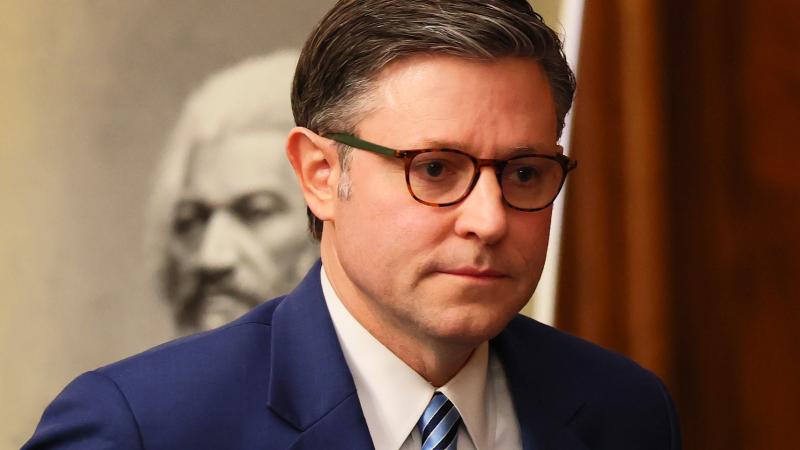House Jan. 6 panel seeks Ethics Committee sanctions for GOP lawmakers who defied subpoenas
The lawmakers were named in the 154-page executive summary of the probe's final report, which was approved by the committee and is expected to be released later this week.
As House Democrats' Jan. 6 panel wraps up its work with criminal referrals for former President Trump, it is also seeking House Ethics Committee sanctions against GOP lawmakers who defied subpoenas to testify before the committee.
The lawmakers named in the 154-page executive summary of the controversial Jan. 6 probe's final report include House Minority Leader Kevin McCarthy, Ohio Rep. Jim Jordan, Pennsylvania Rep. Scott Perry, and Arizona Rep. Andy Biggs.
The committee, chaired by Louisiana Democrat Rep. Bennie Thompson, described the subpoenas as a "significant step" warranted by the "certain volume of information these members possessed that was relevant to the Select Committee's investigation, as well as the centrality of their efforts to President Trump's multi-part plan to remain in power."
In a departure from normal practice, House Democratic leaders rejected GOP leadership choices of Republican members to sit on the Jan. 6 committee, provoking challenge to the body's authority under House rules to depose witnesses.
The committee "isn't properly formed" to claim authority to conduct any depositions under House rules, given that it lacks a formal ranking member from the Republican Party, Timothy Parlatore, attorney for former New York City Police Commissioner Bernie Kerik, told Just the News in April.
According to the committee's executive summary, Jordan and Perry "were involved in discussions with White House officials about Vice President Pence's role on January 6th as early as November 2020."
The summary also said that Perry was "present for conversations in which the White House Counsel's Office informed him and others that President Trump's efforts to submit fake electoral votes were not legally sound."
The committee said Perry was involved in Trump's "efforts to install Jeffrey Clark as the Acting Attorney General in December 2020 and January 2021."
To support the House Ethics Committee referrals, the Jan. 6 panel alleged Biggs had "coordinated with Arizona State Representative Mark Finchem to gather signatures from Arizona lawmakers endorsing fake Trump electors." The committee found that Biggs "contacted fake Trump electors in at least one State seeking evidence related to voter fraud."
The executive summary notes that McCarthy offered to participate via "written interrogatories" but the committee rejected his proposal. Instead, the committee compelled "his appearance for deposition testimony," which did not occur before the panel's set June 11, 2022 deadline.
"To date, none of the subpoenaed Members has complied with either voluntary or compulsory requests for participation," read the report's summary.
The committee emphasized that the referral to the House Ethics Committee for "further action" is "only for failure to comply with lawfully issued subpoenas."
The report's executive summary contained a warning to the House Ethics Committee.
"If left unpunished, such behavior undermines Congress's longstanding power to investigate in support of its lawmaking authority and suggests that Members of Congress may disregard legal obligations that apply to ordinary citizens," read the document. "The Committee also believes that each of these individuals, along with other Members who attended the December 21st planning meeting with President Trump at the White House, should be questioned in a public forum about their advance knowledge of and role in President Trump's plan to prevent the peaceful transition of power."
A spokesperson for McCarthy did not return a request for comment before publication.
Jordan released a statement responding to the committee's final hearing.
Biggs tweeted a response to the committee on Monday.
"This Hollywood-backed committee continues to waste resources and taxpayer money to produce the most biased congressional 'investigation' in this nation's history," he wrote. "In a matter of days, they will be irrelevant (if they weren't already)."
Perry's spokesperson responded to the panel's Ethics Committee referral.
"More games from a petulant and soon-to-be defunct kangaroo court desperate for revenge and struggling to get out from under the weight of its own irrelevancy," said Jay Ostrich, a spokesperson for Perry.
"Congressman Perry is pressing on with his commitment to help his constituents, who, once again — unlike several members of this illegitimate entity — overwhelmingly sent him back to Washington to fix what President Biden and his enablers have broken," he added.
The committee mentioned in the summary that some GOP lawmakers had attended a White House meeting on December 21, 2020 where a plan to "have the vice president affect the outcome of the election was disclosed and discussed."
The committee on Monday also issued criminal referrals to the U.S. Department of Justice for former President Trump and his former lawyer John Eastman. These referrals include "obstruction of an official proceeding," conspiracy to defraud the U.S. and conspiracy to make false statements. Attempting to assist and aid an insurrection is included in the committee's criminal referrals as well.
The panel's full final report, which was approved on Monday, is expected to be released later this week.
In November, Attorney General Merrick Garland appointed a special counsel, Jack Smith, to investigate former President Donald Trump's actions related to the Jan. 6, 2021 riot and his handling of classified information post-presidency.














